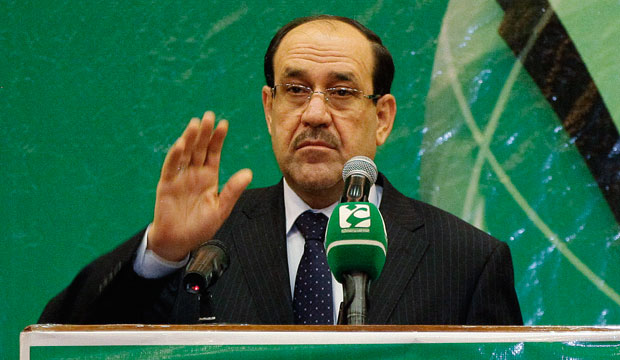
Iraqi Prime Minister Nouri al-Maliki speaks during the 32nd anniversary of the foundation of the Badr Organization in Baghdad, Iraq, Saturday, July 27, 2013. (AP Photo/Karim Kadim)
Baghdad, Asharq Al-Awsat—In a speech delivered Friday, Iraqi prime minister Nouri Al-Maliki called on his political rivals to invest in oil rather than seeking foreign investment.
During the inauguration ceremony of Al-Gharraf oilfield in the Dhi Qar province in the south of Iraq, Maliki stressed the need to adopt a “policy of investing in oilfields and developing [oil] resources,” urging Iraqi politicians to “invest in oil instead of resorting to political rivalries.”
Maliki, who praised the country’s economic growth in his speech, called on the Ministry of Oil to promptly “establish Dhi Qar Petroleum Company in order to develop the oilfields in Dhi Qar.”
Maliki’s comments came two days after Iraq’s political leaders signed a national honor code aimed at establishing social peace in the country. The prime minister’s comments have been taken in some circles as implied criticism of the leader of the Iraqi National List, Iyad Allawi, who refused to sign the honor code.
Speaking exclusively to Asharq Al-Awsat, State of Law Coalition MP Hassan Al-Yassiry said it was still possible to amend the honor code to encourage more politicians to sign it.
“The parties who did not come to sign the honor code—the social peace initiative—may have their own reasons that have prevented them from attending and participating. But it still is necessary to differentiate between . . . . those who boycotted from the outset and announced they did not recognize the initiative and what might result from it, such as Dr. Iyad Allawi,” and those who “objected only to procedural provisions, and not the overall goals of the code, such as Deputy Prime Minister Saleh Al-Mutlaq.”
Yassiry made clear that “there have been parties who were strongly supportive of the code and the initiative, such as the Sadrist Movement.”
“Maliki has invited all [sides] to move towards building Iraq . . . after the principles of the code have been agreed upon,” he added. “Maliki wants to explain to everybody that the door is open now to work hand-in-hand without resorting to what the outside dictates.”
In separate news, the leader of the Sadr Movement, Muqtada Al-Sadr, called on the Organization of Islamic Cooperation (OIC) to hold an emergency meeting in order to “find effective solutions to the sectarian strife terrorists are trying to cause in society.”
Sadr said: “Muslim scholars and sages have to push to end sectarian strife in Muslim countries, and especially in Iraq.”
